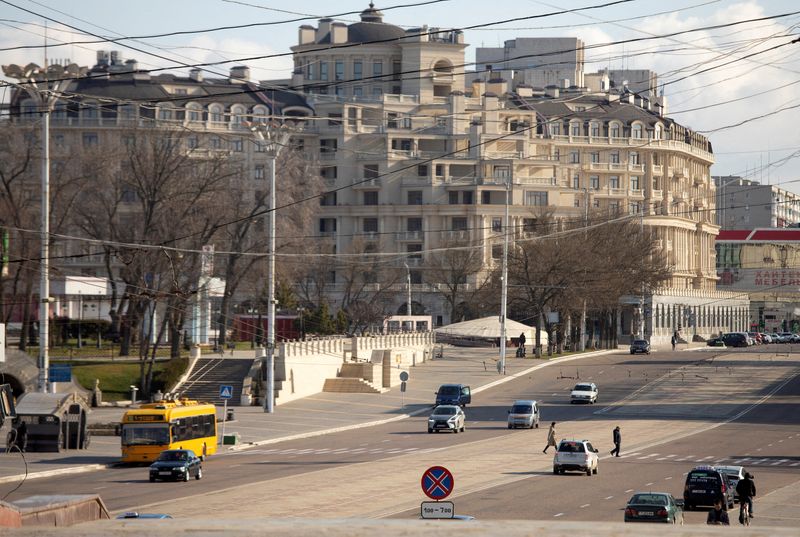(Updates graphic, no changes to text)
By Alexander Tanas
CHISINAU (Reuters) -Moldova's breakaway Transdniestria region asked Russia on Wednesday to help its economy withstand "pressure" from the Moldovan government, at a gathering of officials that the Chisinau administration dismissed as a propaganda event.
Here is an overview of the region, adjacent to Ukraine and seen as a potential flashpoint with Russia.
WHAT IS TRANSDNIESTRIA?
The unrecognised, mainly Russian-speaking statelet occupies a sliver of land along the eastern bank of the River Dniester.
The region broke away from then-Soviet Moldova, where the Romanian language dominates, in 1990. After the breakup of the Soviet Union in 1991, pro-Russian separatists fought a brief war with Moldovan government forces.
The separatists feared that Moldova, which has a Romanian-speaking majority, could one day become a part of Romania, as it had been before the Soviet Union took control in 1940.
Transdniestria's economy is dominated by Sheriff, a sprawling and powerful conglomerate that owns Sheriff FC, a soccer team from the regional capital Tiraspol that beat Real Madrid in the group stage of the UEFA Champions League in 2021.
WHAT IS RUSSIA'S INTEREST?
Moscow helped mediate an end to the fighting in 1992 and a force of almost 1,500 Russian peacekeepers and soldiers is still stationed in Transdniestria, according to regional authorities. They also guard a huge arms depot dating back to the Soviet Union.
Transdniestria's unresolved status, dependent on Russia, gives Moscow a foothold in Moldova, a poor country whose current government is struggling to free itself from Russian influence and eventually join the European Union.
No country recognises the independence of the territory, which borders southwestern Ukraine and still uses the Soviet Communist hammer-and-sickle as a state emblem. It has its own currency, the Transdniestrian rouble, and its own army.
The region is poor and relies on Russian natural gas, which it does not pay for. A debt of more than $10 billion has built up, according to Russia's Gazprom (MCX:GAZP). Russia sees the debt as Moldova's; Moldova does not.
Of the 450,000 population, many hold more than one passport. More than 250,000 have Moldovan citizenship, according to Moldova; more than 220,000 have Russian citizenship, according to the region; 130,000 have Ukrainian citizenship, according to the Ukrainian ambassador.
WHY IS TRANSDNIESTRIA IN THE SPOTLIGHT?
Russia's full-scale invasion of Ukraine in Feb. 2022 sparked fears that Moscow might seek to sweep westward through southern Ukraine all the way to Transdniestria, linking up with its garrison there. Those fears faded in 2022 as Kyiv's troops beat Russian forces back to the eastern side of the Dnipro river.
Tensions have periodically surged during the war and Moldova's relations with Moscow have frayed as it has set out on the path to EU membership.
Moldova's government has repeatedly said it is committed to a peaceful solution of the Transdniestria conflict. It also says it has been making "small steps" towards Moldova's "economic reintegration".

Transdniestria's long border with Ukraine has been closed during the war, meaning that its imports and exports must travel through Moldova.
In January, Moldova brought in new customs regulations requiring Transdniestrian companies to pay import duties into the Moldovan budget. The breakaway region says this has cut its own customs revenues by 18%.